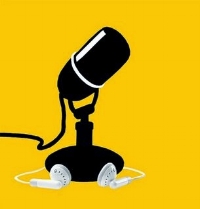
First read this …
Charles Roberts, America News - November 11, 2015
… and marvel at the stunning insensitivity it took for this woman to congratulate herself for doing a good deed, after “stubbornly” overruling a disabled veteran who said several times he didn’t need or want her help, and forcibly helping him anyway. It takes a lot for a news item to stun and offend me personally, but this one had me swearing aloud to my iPhone.
Now read Dominick Evans’ terrific blog post about the story:
Dominick Evans - December 16, 2015
Yes, it’s “Inspiration Porn” again. Why are we so bothered by people who are just trying to be kind? Why won’t we leave it alone?
Because it keeps happening, it’s genuinely disturbing, and people keep finding ways to make it even worse.
Still, I hate being a sourpuss. Just because I loathe sentimentality, doesn’t mean that all sentiment is wrong. Just because I don’t exist for your inspiration, doesn’t mean it’s wrong to feel inspired by whatever happens to inspire you. The alternative to Inspiration Porn isn’t gross negligence, like
stepping over a disabled man choking to death in a McDonalds. There are decent, acceptable ways to be decent, kind, and helpful to disabled people.
Can you do a "good deed" for a disabled person without offending them?
Is it possible to do inspirational stories about disabled people without being smarmy and condescending?
Yes and yes!
First ask, "Can I help you?", and then respect the answer. And if the answer is "No thank you," or even just plain "NO!", don't take it personally. How each disabled person answers depends on many factors. I’m not often asked if I need help. When I am, I usually say, “No thank you, I’ve got it” because I’ve got it. Sometimes I say, “No thanks,” then pause a moment, survey my situation, and say, “Actually, yeah, that would be great, could you …?” and then I tell the person exactly how they can help. Sometimes, I say, “Yup!” right away, and hand them the whatever that I’m trying to carry while inching my way down some stairs. The point is, it’s fine to ask, I call the play, and the only really offensive thing is if you don’t listen to my answer.
What about pictorial depictions of bravery, kindness, perseverance, inspiration, like Facebook memes or YouTube videos?
Never snap a photo, never shoot a video about a disabled person without the disabled person's consent. It doesn’t matter that you admire the thing you are depicting. It doesn’t matter that you do it to make people happy or uplift them, or teach them a lesson about gratitude. What matters is the result, and if the disabled person isn't on board with the situation or being used in your little morality play, any good you think you’re doing will be undone.
Above all, make sure the disabled person has a voice in the story or scenario or whatever it is you’re focused on. If you write about an actual, named, identifiable disabled person, ask the disabled person to comment and include what they say. You’ll discover pretty quickly whether they think the situation is amazing and remarkable, or pretty standard and nothing to crow about. And that should be your guide on how to think about it, too. Follow the disability rights movement motto: "Nothing about us without us."
If you focus on a disabled person overcoming adversity, ask questions about that adversity and why it is there. Stories of individual courage and character are uplifting, but disability discrimination and hardships don't happen in a vacuum. The problems disabled people face usually come from or are made worse by the bad choices and neglect of actual people and institutions that should be challenged. Battling institutional ableism doesn’t translate so easily to cute Facebook posts that make people go, “Awww!” but that’s part of the point. And anyway, fighting discrimination IS inspiring!
Finally, remember that not every disabled person craves "going viral." Most disabled people just want to get on with life. Believe it or not, many of us strongly prefer anonymity! Most importantly, we all want to be treated as people, with three full dimensions, unique points of view, and complex feelings, not cardboard cutouts employed to symbolize abstract values, or tools to make you feel swell and become Internet-famous.
But what if I can’t follow all these conditions and still tell my story?
Simple … just don’t tell the story! Sometimes, a little restraint is the best, most uplifting gift of all.
----------










